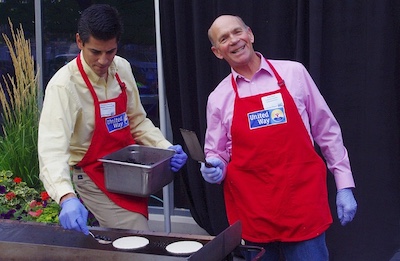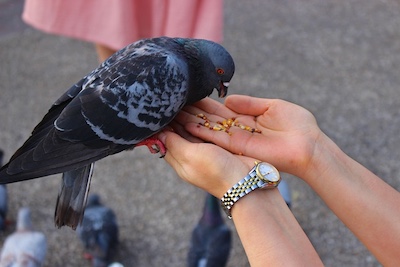Coaching
to Create Best Practices in Your Nonprofit Programming
- Home
- Small Nonprofit Practices
- Coaching to Create Best Practices in Your Nonprofit Programming
Coaching to Create Best Practices in Your Nonprofit Programming contains the last four practices of program related actions you can measure yourself against.
How has your organization taken advantage of Part One, "Coaching Leaders of Smaller Nonprofits to Evaluate Programming?"
Remember, there are so many types of small nonprofit programming. Adults, children, services, in-house, remote, online etc etc. Make these 8 practices work for you. Let them spark your thinking and reword them to fit your situation. Then evaluate against that.
What will be most important for you to pay attention to in Part Two?
Your program is key. Crafted and delivered well, it can significantly impact those you serve.
53. Staff
is both professional and fun-loving

This is Practice 53 of 80
No one neglects their job, but occasions do come up to have fun with participants.
Encourage the staff to look for those brief opportunities that say, “We are really glad you are here. Let’s have some fun together.” Happy staff makes for happier participants. Show it.
- How will people know we are having fun too?
- What conversations have you had with staff about taking a few minutes from other duties to lighten the experience of participants?
- What guidelines and boundaries are around this time?
- How can favoritism be avoided?
Why This Practice is Important
Adopting a professional and fun-loving attitude can result in a happier staff and participants who really got a great experience because they made friendships, or connections with others, in a lighter experience. Participants might not say it, but they have been made to feel significant.
The Key Concept, Attitude or Action That Drives This Practice
PARTICIPATION
An Expansive Thought
It is important to recognize the boundaries and possible issues that can arise and ensure that staff knows when to draw the line.
An Action Point
Teach your staff how to inject a more fun attitude, and happy demeanor into normal daily activities, and be spontaneous.
54. If appropriate make use of nature and outdoor activities

This is Practice 54 of 80
Depending on the nonprofit, participants may find themselves outside a good part of the time. Other participants that come to our programs are indoors most of the time.
In general .. get them outside in an enjoyable setting. Most organizations try to have nice surroundings. Make use of them. Increase your outdoor programming. Cultivating an outdoors attitude may have to be deliberate and strategic.
Find staff that can make the outdoor experience come alive. Point to the Creator. Maximize the usage of any natural assets you have.
- Do an inventory of your surrounding natural environment. How much of it do you actually use?
- Who is available to make this area outstanding?
- Identify areas that have potential for outdoor development or program possibilities.
- On a scale of 1 - 10, identify how creative you are in using the outdoors. What could you do to improve that?
Why This Practice is Important
It is vital to make the most of all resources available in your facility. By doing so you will maximize opportunities to serve participants as well as add value and variety.
The Key Concept, Attitude or Action That Drives This Practice
RESOURCES
An Expansive Thought
Emphasizing outdoor activities can go hand-in-hand with a “green” and/or “healthy” nonprofit. If you had a Director of Outdoors what would their job description read?
An Action Point
Make a hot list of five things you can do right now to enhance the outdoor appeal of your facility to participants. Now go do them.
55. Participants are not forced to take part in all activities

This is Practice 55 of 80
People come with a whole lot of baggage in their lives.
One exposure to your program may change that completely, but it may not. Be sensitive to resistance.
When doing any kind of activity, discern between a lack of knowledge or experience and real fear based on past experiences. Gently nudge the lack of knowledge, but don’t push the fear. Sensitize your staff to this. Discerning when and how to involve a participant is vital.
- How often have you had people in to train in this area?
- How do you currently handle these situations?
- How could you more creatively accommodate this type of person?
Why This Practice is Important
As with most service-oriented organizations, it is vital that staff understand the importance of being sensitive to participant's needs and feelings. Specialized training may be needed in this area.
The Key Concept, Attitude or Action That Drives This Practice
DISCERNMENT
An Expansive Thought
People communicate in so many different ways. How can you tell what the real message is?
An Action Point
Make a list of all staff and jot down notes about how you feel each can handle being sensitive. Get to work addressing the needs that will become apparent from your list. Involve an experienced professional in this area of staff preparedness.
56. Participants are recognized for their achievements

This is Practice 56 of 80
Not only the athletes are recognized.
You always meet old participants of some small nonprofit programs who still point to the meaningful, but simple award they received as a kid, as a family or in some silly have-fun event you put on. Recognize good things. God calls us to build up and equip for living life to the full.
- How can we recognize good things, without making others feel left out?
- What could you do to have every participant feeling recognized and built up, without coming across as condescending?
Why This Practice is Important
Part of a unique experience is ensuring that every participant goes away with a good feeling about themselves and their time with you. Esteem isn’t a faulty structure. It is a God-built foundation of value and dignity.
The Key Concept, Attitude or Action That Drives This Practice
ESTEEM
An Expansive Thought
Just imagine a young person, an adult, or an elderly individual going away feeling appreciated and special, regardless of personal abilities or interests.
An Action Point
Find a way to let each individual know they are appreciated and special, not because of special skills or knowledge, but because they simply ARE special. Find the good things in your participants and think about this.
This is the end of Coaching to Create Best Practices in Your Nonprofit Programming.
To review the four programming best practices in Part One, click here.
How have you used or modified points from Coaching to Create Best Practices in Your Nonprofit Programming?
As I mentioned at the top, using Coaching to Create Best Practices in Your Nonprofit Programming can be interpreted differently for differing organizations. As written, it may or may not work for you.
But having said that, it may also spark some ideas for how to word what you actually do. Then check yourself against that.
Contact me here Privacy Policy
© G.E.Wood and Associates. All Rights Reserved in all media.
G.E. Wood and Associates is an international coaching firm registered in Ontario, Canada
142 Pratt Crescent, Gravenhurst, Ontario, Canada, P1P 1P5